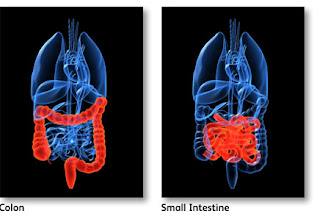Crohn's disease is closely related to another chronic inflammatory condition that involves only the colon called Ulcerative Colitis. Crohn's Disease and Ulcerative Colitis are commonly referred to as Inflammatory Bowel Disease (IBD).
The symptoms of Crohn's Disease fluctuate between mild and severe and periods of remission and flare-ups. They are also different depending on what type of crohn's the individual has. There are different areas of the digestive tract that could be affected. Some common symptoms are:
- Abdominal Pain
- Diarrhea
- Weight loss
- Fever
- Fatigue
- Loss of appetite
- Pain while passing stool
- Night sweats
- Rectal pain/bleeding
- Constipation
- Eye Inflammation
- Fistulas
- Joint pain
- Liver Inflammation
- Mouth ulcers
- Rash
- Swollen gums
There is no cure for Crohn's. Treatment depends on where you are at with the disease. Some people may not require treatment and some may not require treatment during periods of remission or inactivity.
 DIET- One should ensure that they eat a well-balanced diet to avoid malnutrition and weight loss. You may need extra vitamins and minerals such as; Iron, Calcium, Vit D, or B-12 if you are anemic. Certain types of food may worsen diarrhea and gas when you are in a stage of symptoms. It is best to:
DIET- One should ensure that they eat a well-balanced diet to avoid malnutrition and weight loss. You may need extra vitamins and minerals such as; Iron, Calcium, Vit D, or B-12 if you are anemic. Certain types of food may worsen diarrhea and gas when you are in a stage of symptoms. It is best to:- Eat small amounts of food throughout the day
- Drink lots of water (small amounts throughout the day)
- Avoid high-fiber foods
- Avoid fatty, greasy, or fried foods and sauces
- Limit dairy if you don't digest it well
- Avoid or limit alcohol or caffeine
- Antiinflammatory Medication
- Antibiotics
- Corticosteriods
- Immune Suppressors
Surgery- If medicine does not work, then surgery is another option. A bowel resection may be needed to remove damaged or diseased intestine or to drain an abscess. Surgery does not cure the disease, however it usually results in great improvement in the patient's quality of life, often for years.
A person afflicted with this disease is followed by a Gastroenterologists for their medical care relating to Crohn's Disease.




No comments:
Post a Comment